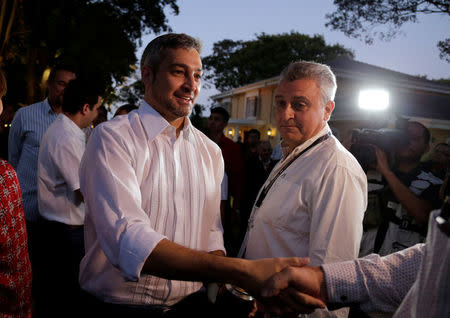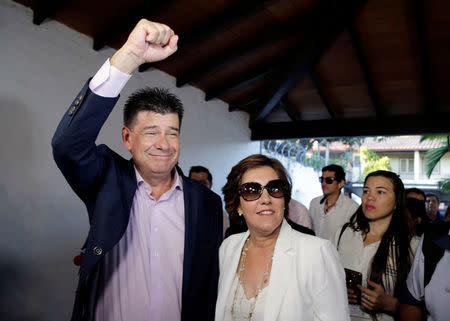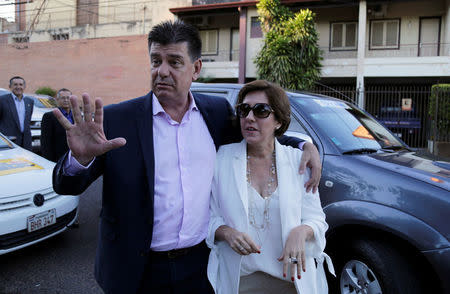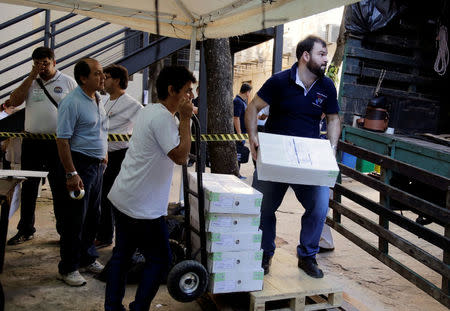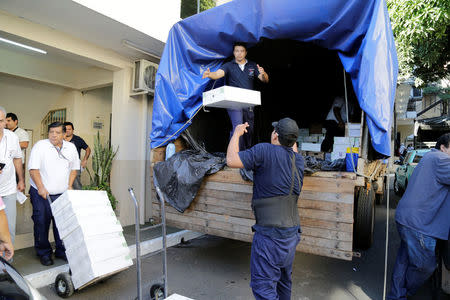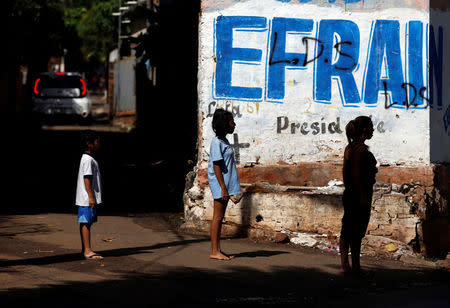Conservatives seen keeping power as Paraguay goes to the polls
By Daniela Desantis and Mariel Cristaldo
ASUNCION (Reuters) - Paraguay is picking a new president in an election on Sunday, with the Colorado Party expected to keep power but lose seats in Congress, which could complicate its pro-business agenda and raise the risk of higher taxes on the country's key farm sector.
Mario Abdo, a 46-year-old former senator who campaigned for the Colorado Party on an anti-corruption platform, supports current low-tax policies aimed at stimulating foreign investment and agricultural production in Paraguay, the world's No. 4 soybean exporter and a major supplier of beef.
Abdo, who set the stage for governing with a minority in Congress by calling for dialogue with opposition parties, has promised to fight pressure to raise taxes despite calls from the opposition for a levy on soybean exports. Pre-election opinion polls showed him 18 to 20 points ahead of candidate Efrain Alegre, a lawyer from the center-left GANAR coalition.
Outgoing president Horacio Cartes, who tried but failed to change the constitution to allow him to seek a second consecutive term, is running for a Senate seat.
Abdo is the son of the late private secretary of dictator Alfredo Stroessner, who ruled Paraguay with an iron hand for 35 years. Abdo, who was 16 when Stroessner's regime ended in 1989, has vowed to respect human rights and democratic institutions if elected.
"I am going to lead a wide national dialogue," Abdo told reporters before going to cast his ballot. Later he visited the tomb of his father, as he did on the day of the primary election in December when he won the nomination of the Colorado Party.
Abdo's conservative policies and family history are a concern to some voters who have doubts about his commitment to clean up government.
"This is a country of corruption and until we end that we will not move forward. Mario Abdo is a son of the dictatorship and I do not think he will govern well," said Edgar Gonzalez, 45, on his way out of his voting station in a high school in the upper-middle-class neighborhood of Trinidad in Asuncion.
Local television gave wall-to wall coverage of the voting, which took place under sunny Southern Hemisphere autumn skies, without disturbances or reports of significant election fraud.
SOY TAX DEBATE
Grains-dependent Paraguay produced more than 10 million tonnes of soy last year and is trying to attract investment needed to reach its goal of 20 million tonnes by 2028.
Polls say Abdo's party is likely to lose some of the 20 seats it has in Paraguay's 45-member Senate, which last year debated a bill to slap a 10 percent tax on soybean exports.
"The push for an export tax will intensify after the election, which is likely to see the empowering of the Frente Guasu, a major proponent of the initiative, and a party which is expected to substantially increase its presence in Congress," said Thomaz Favaro, an analyst for consultancy Control Risks.
Abdo may have to support the export tax to safeguard other parts of his investment-friendly agenda.
"Uncertainty over the level of taxation for the agriculture industry will thus likely persist in the short-to-medium term," Favaro said.
About 4.2 million Paraguayans are eligible to vote in the election, which will also renew all seats in Congress and 17 governorships. The new president will take office on Aug. 15.
(Writing and additional reporting by Hugh Bronstein; Editing by Daniel Wallis and James Dalgleish)

